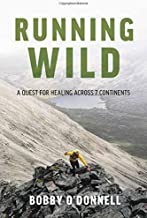Running Wild by Bobby O'Donnell
Boom! The terrible, percussive sound of the first explosion drowned out every other noise in Boston, both literally and figuratively. The horror of that sound on a sunny Monday afternoon, April 15, 2013, was just the start of the chaos.
An apt description so far as Bobby O’Donnell is concerned, as brilliantly relayed in Running Wild (Mascot Books), a relentlessly riveting account of the unique and heroic recovery he staged from Post-Traumatic Stress Disorder. Like many afflicted with PTSD, the effects and symptoms didn’t begin to manifest themselves right away for the then eighteen-year-old who was approaching the finish line of the Boston Marathon when the first bomb went off.
My anger and frustration only intensified when the nightmares began weeks later … Night after night I would awaken tangled in my sheets, drenched in sweat.
Those nightmares became Bobby’s secret, as he sought relief from something he neither understood, nor was equipped to deal with. What follows reads like a millennial version of The Odyssey, as Bobby finds solace in a quest that gives the old adage “getting back on the horse” a whole new meaning: He set out to run marathons, or 50-mile ultra-marathons, on all seven continents.
The quasi-mythic adventure that followed forms the crux of the book’s structure, taking us with him on a journey that’s equal parts healing and self-discovery. Starting with Bobby’s triumphant return to the Boston Marathon a year after the bombing, we’re whisked away to the likes of Mt. Kilimanjaro in Tanzania and even Mt. Everest (for the Everest Marathon), along with stops in Chile, Scotland and even Antarctica among others. Kilimanjaro is especially relevant, given that Bobby often resembles the kind of rugged individualist Ernest Hemingway was so fond of writing about.
In that respect, the marathons themselves pale in comparison to Bobby’s travels — the adventures he shared, friends he made, relationships he formed. The impact and power of the book’s narrative stems, you might say, from the journey itself, as opposed to the seven-plus destinations he covers along the way.
I started to come to terms with the fact that although I couldn’t see it at the time, maybe the marathon bombing was a blessing in my life. Had it never happened, it’s unlikely I would have ever escaped from my comfort zone to see what a beautiful place the world really is.
At its heart, Running Wild is eerily akin to the similarly titled Into the Wild, Jon Krakauer’s harrowing account of Christopher McCandless’s ill-fated journey to Alaska, albeit with a much happier ending. Indeed, this is Jack Kerouac’s On the Road for a new generation, a kind of post-modern take on the classic Zen and the Art of Motorcycle Maintenance. A passion-packed, angst-riddled, uplifting tale that traces the baring, and redressing, of a soul.





